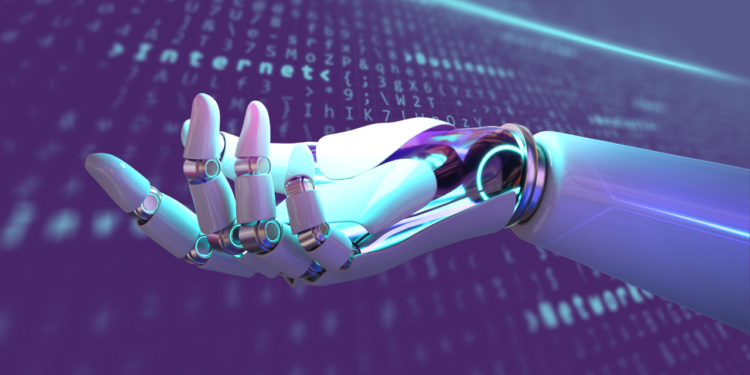- The World Economic Forum estimates that 85 million jobs will be replaced by machines with AI by 2025.
- What happens when workers self-automate their own jobs? Better yet, is that allowed? What if employers catch wind of this, and simply cut out the middle man (the human worker) to save money?
- We spoke to Mikaela Pisani, the head of machine learning for Rootstrap, an outcome driven software development company, in order to get a better understanding of this phenomenon.
For years, there have been predictions that artificial intelligence will take a certain percentage of jobs away from human workers. In a sort of doomsday-manner, organizations have predicted that tens of millions of workers will be displaced by their robot counterparts in the next few years.
According to a McKinsey study, AI could replace up to 30% of the global workforce by 2030. The World Economic Forum estimates that 85 million jobs will be replaced by machines with AI by 2025.
AI technologies have reduced repetitive work and enhanced work efficiency. Because of this, almost every industry is planning to leverage it — or has already implemented it.
According to Sanjoe Jose, CEO of Talview, as AI becomes more utilized, “Human productivity will rise significantly leading to exponential growth in value creation and breakthroughs that help us to achieve feats that we probably are not even envisioning as a civilization. And the gap of value generated per individual between knowledge workers and non-knowledge workers will increase further.”
The question is no longer whether AI will change the workplace; it’s how companies can successfully use it in ways that help (not replace) the human workforce.
No matter what happens in the future, something more interesting is happening already: workers are utilizing AI themselves to make their jobs easier.
“While the threat of automation is playing itself out in the media, some workers have taken matters into their own hands and started to automate various aspects of their jobs, from data entry to inventory management and database administration,” according to Forbes.
What happens when workers self-automate their own jobs? Better yet, is that…allowed? What if employers catch wind of this, and simply cut out the middle man (the human worker) to save money?
There are many ethical questions being raised as employees of all sorts are using AI generators, such as CopyAI and ChatGPT, to write articles, blog posts, web copy, and a multitude of other media. Many other professions are also using this tech; computer engineers can use AIs such as Python to write code.
“It’s time we turn the conversation from employers using automation to displace jobs to workers using technology to find better ways to do their jobs!” said the same Forbes article.
We spoke to Mikaela Pisani, the head of machine learning for Rootstrap, an outcome driven software development company, as well as Arjun Chandar, founder & CEO of IndustrialML, to get a better understanding of how people are putting their jobs on autopilot.
Allwork.Space: Workers are using AI to make their own jobs easier; will this be allowed in the future of work?
Mikaela Pisani: Sooner or later companies should accept the use of AI as a tool.
If workers can use AI to simplify their workflow, they will likely become more efficient and happier, while also gaining more time to focus on other tasks.
For example, a copywriter, with the help of a tool like Chat GPT, may be able to speed up content generation for articles. As a result, they can spend the newfound time studying methodologies to create more engaging content. A programmer that uses Codex may create code faster and then invest time testing or researching a new technology.
However, it is important to note the use of AI should be done in fair, ethical ways. Moreover, the biases of AI algorithms should be taken into account. Thus, companies should educate workers to use AI as a tool and not as a replacement for their work.
Arjun Chandar: Absolutely; plenty of companies are developing and offering low-code or no-code tools to build machine learning models. Plant floor workers can use these tools to analyze images and obtain product quality, or remove their data entry burden when documenting actions they have taken. Most industries will benefit from workers using AI tools within the context of their jobs.
Allwork.Space: Will employers cut out the middleman and just use AI?
Mikaela Pisani: In some cases, employers may choose AI to reduce costs and improve efficiency, which might remove some human labor in the process. But, generally, the use of AI requires other types of human efforts to complement the work.
In my opinion, the way AI affects companies and the workforce largely depends on the industry. For instance, in transportation, drivers will still exist but they may interact with AI to prevent accidents or identify the best routes. In healthcare, doctors may make decisions with more information, so they can provide more accurate and personalized recommendations.
In conclusion, with the AI revolution, humans must adapt their work and use AI as a tool in order to make better decisions. Also, since AI still faces some limitations, there are many jobs that cannot be completely replaced by machines — at least not in the near future.
Arjun Chandar: There is some extent to which work previously done by people can be automated, but by and large, AI will not replace human intuition in areas like manufacturing or the energy sector. There is too much instruction about how to troubleshoot, which AI is years away from adequately learning for itself.
More likely, allowing the “middle man” to use AI to reduce their workload will allow them to do more of the high-cognition tasks which they sometimes fall behind on now.

















